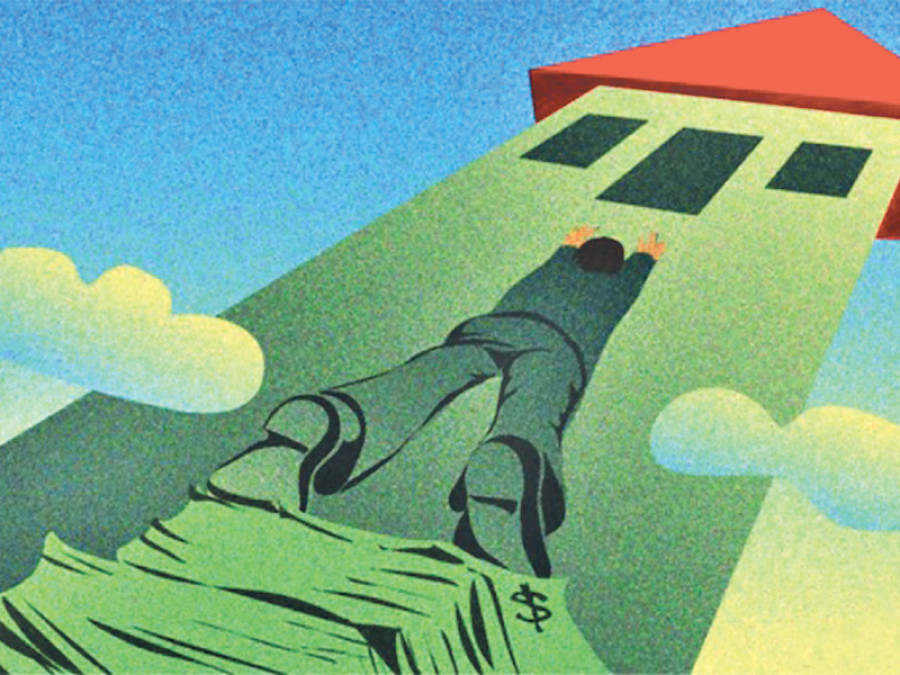Opinion
Only money
People are only concerned about materialistic gains
Raj Kumar Baral
I could never understand the meaning of god nor could I be assured of his existence. When I was a student and now even as a teacher, I have heard a lot about him, sometimes as the creator of the entire universe who with the decrees like, “let there be light, hill, oceans...”, (in Christianity) could create anything of his desire, and, at other times, as the nurturer and destroyer in different guises like Vishnu and Mahesh in the Hindu mythology. Again, declaration of his ‘death’, (though metaphorically, which I learnt later) had baffled me seriously in those early days as a novice theory learner.
My understanding about gods, if they really do exist, is that they transcend the worldly things, have transcendental values and cannot be evaluated in terms of any material things. But I find my understanding gone astray when I go to or happen to reach the vicinity of temples and religious shrines like Pashupatinath or Daksinkali, where I am surrounded by some shopkeepers who want to sell their pooja samagri (materials for worshipping) by hook or crook. Almost every time I see the same amount of materials—flowers, coconut, etc. in their plates—but there is a fierce competition among the shopkeepers. To attract visitors like me, they heartily offer water for people to wash hands. Such incidents elicit multiple questions: What is the actual price of those materials used for worshipping? More seriously, do gods have prices? Do expensive worshipping materials make gods happier than cheaper ones? I have not been able to find answers to these questions till date.
This is not the only incident that has baffled me. The advertising agencies too are found busy in reifying religion and deities for economic boon and social recognition. The idea of spirituality becomes a commodity when it is valued vis-a-vis exchange value or sign value. Similarly, ‘images’ of deities have been tattooed on arms and sold on t-shirts, shoes and billboards.
In 2012, a California-based multinational company, for example, used images of Lord Buddha on shoes, a perishable object, just to make economic gains. This incident outraged the Tibetans and the Buddhist community. Tibetans and Bhutanese Buddhists wrote to the company, Icon Shoes, to express their disgust. They flooded the company’s Facebook page with protest notes.
The International Buddhist Community had to issue a notice to the concerned business houses, designers and production companies to stop using any type of Buddhist images on any of their goods. The community requested the concerned companies to pull out all existing catalogs from their retailers or online shops
and stop selling such goods that hurt the sentiments of Buddhists around the world. Additionally, they also said that they did not want any company to repeat such a disrespectful act.
Similarly, images of Jesus have been used to attract individuals to wine culture. The myth of Christianity that Jesus mixed water and fire to make wine has been misused to promote alcoholism. The famous Budweiser beer had designed a billboard with Jesus holding a can of beer between the phrases,”King Of Jews” and “King Of Beers”. This incident that took place in Baltimore, America created an uproar and the billboard was eventually covered with white paint.
In shops around Kathmandu, one can see the religious things like the book of Veda, Ramayana, Mahabharata, Swasthani, the statue of the gods and goddesses and goods of everyday necessities together. During Tihar at Lagankhel area, I had even seen posters of deities under pieces of a recently killed buffalo or pig.
In all these instances mentioned above, what seems dominating is the influence of growing capitalism that has corrupted society. In today’s time, people are only concerned about materialistic gains even at the cost of gods and spiritualism. Using icons of deities, tattooing them and printing them or competing fiercely for selling worship materials eventually advances the selfish agenda of promoting capitalism through consumerism. Every other thing has become pale and fragile under the capitalistic ideology.
Baral teaches at the Central Department of English, Tribhuvan University, Kirtipur




 13.25°C Kathmandu
13.25°C Kathmandu










